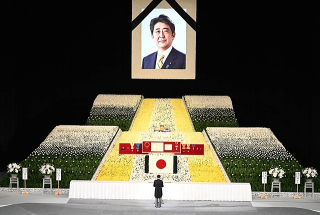Abe's state funeral sours Kishida's popularity

State Funeral of Abe Shinzō. Source: 首相官邸/Wikimedia Commons.
Australia & Japan in the Region
Volume 10, No 9, September 2022
The assassination of former Japanese prime minister Shinzo Abe has shed light on a concerning relationship between the Unification Church and the ruling Liberal Democratic Party (LDP). The suspected assassin, Tetsuya Yamagami, harboured a grudge against the church because of the significant donations made by his mother that left his family bankrupt.
Tetsuya Yamagami is one of many victims of the Unification Church’s questionable relationship with extravagant donations. The church’s potentially criminal activities have frequently been reported in the media since the 1980s. Still, Abe delivered a video message at an event hosted by an affiliated group of the church, during which he praised its leader.
The church has had close connections with LDP lawmakers since the time of former prime minister Nobusuke Kishi (1957–1960), Abe’s grandfather. Kishi and the church found common ground in the fight against communism. After seeing the video message, the suspect reportedly decided to shoot Abe instead of the church leader.
Shortly after the assassination, Prime Minister Fumio Kishida decided to hold a state funeral for Abe on 27 September 2022. Kishida claimed that the state funeral was in ‘defence of democracy’ — suggesting the murder of Abe during the upper house election campaign was a heinous act that damaged Japan’s institutions.
But Prime Minister Kishida’s explanation has not convinced the public that the funeral is in defence of democracy. Public opposition has increased as the date of the funeral approaches.
A survey conducted by Yomiuri Shimbun in early September showed that 38 per cent of Japanese citizens were in favour of the state funeral and 56 per cent were against it. Another survey, conducted by NHK on 11 September, showed that 32 per cent were in favour and 57 per cent were opposed, while a Mainichi Shimbun survey held on 18 September revealed that 27 per cent were in favour and 62 per cent were opposed.
There are several reasons why the public is opposed to a state funeral. The legal basis is unclear and many citizens question the huge amount of public funds that will be spent on the proceedings.
Prime Minister Kishida repeatedly stated that he would ‘carefully explain’ the significance of the state funeral, but he has only done so on 13 September during a brief out-of-session National Diet meeting. Kishida said a resolution was not necessary to hold the state funeral and that the expenses would be covered by the government’s reserve fund. He gave no further reasons for the decision.
The death of Queen Elizabeth II on 16 September highlights the sharp contrast between how the United Kingdom and Japan regard state funerals. In the United Kingdom, the Queen was revered across party lines as a symbol of national unity and a state funeral was held for her with the consent of the parliament. In contrast, Kishida decided to hold Abe’s state funeral for the political benefit of those in power, especially politicians within Abe’s faction.
A state funeral for a monarch with no political power would be acceptable. But Abe was a polarising politician who exercised political power for over a decade.
During his tenure as prime minister, Abe divided the public when he changed the interpretation of the constitution to enshrine the right to collective self-defence. Abe’s wife is believed to have been behind a dubious sale of state-owned land to a school corporation run by a friend at an unreasonably low price. And as media coverage reveals close ties between the Unification Church’s local organisations and right-wing LDP members, opposition to the state funeral has intensified.
After the global collapse of communism, the church began to attack women’s rights as another form of communism. It argues that sex education, including the discussion of contraceptive methods in high schools, encourages sexual behaviour. The church also believes that the system of optional separate surnames for married couples will lead to the disintegration of the traditional family unit.
By helping assembly members win local elections, the church has been able to exert pressure on local education boards to withdraw curriculum plans that focus on gender equality. The fact that the close ties between the LDP and the Unification Church may have interfered with policymaking processes is seen by Japanese people as a greater threat to democracy than Abe’s assassination.
With the increase in opposition to the state funeral for Abe, Kishida’s approval rating has declined, reaching as low as 28 per cent in September according to a Mainichi Shimbun poll on 18 September. Kishida’s defiance of public opinion over the state funeral has created a crisis for his administration.
Jiro Yamaguchi is Professor at the Faculty of Law, Department of Political Science at Hosei University.
Image sourced from Wikimedia Commons. Image available at 首相官邸ホームページ.
Updated: 20 April 2024/Responsible Officer: Crawford Engagement/Page Contact: CAP Web Services Team










